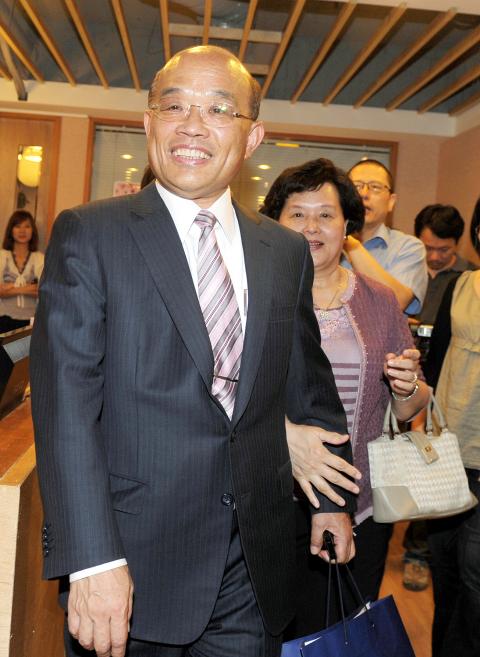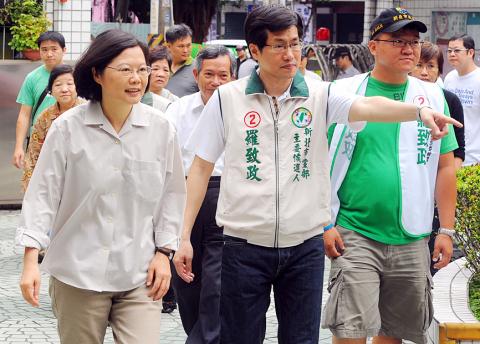Former premier Su Tseng-chang (蘇貞昌) yesterday became the new chairman of the Democratic Progressive Party (DPP), easily beating his four opponents in a race that could have a major impact on the future direction of the party.
Su obtained 50.47 percent of the vote by 163,808 registered members, with former Tainan County commissioner Su Huan-chih (蘇煥智) coming a distant second, with 21.02 percent.
The 64-year-old will serve as the DPP chairperson for the second time, after a brief stint between February and December 2005.

Photo: CNA
Su Tseng-chang, who was regarded as the front-runner from the outset, now has to live up to his pledge in election-eve advertisements in local dailies calling for party unity as the DPP faces major mayoral and commissioner elections in 2014 and a presidential election in 2016.
The turnout rate of 68.62 percent — an all-time high for the party — was better than the expected 50 percent, the DPP said.
A total of 240 polling stations for four elections were set up around the nation between 8am and 4pm.

Photo: Wang Min-wei, Taipei Times
In addition to a new chairperson, party members selected regional office directors and regional and national representatives.
Despite the election being described as a “four-on-one battle against Su [Tseng-chang]” televised vote counting results showed that he pulled away early.
Former chairperson Tsai Ing-wen (蔡英文), who resigned in March following her loss in the Jan. 14 presidential election, cast her vote in Yonghe District (永和), New Taipei City (新北市), in the morning and said that organizational work at the grassroots level would be crucial for the new party boss.
Former vice premier Wu Rong-i (吳榮義) was third with 16,315 votes, or 14.73 percent, while former DPP legislator Chai Trong-rong (蔡同榮) and former DPP chairperson Hsu Hsin-liang (許信良) ranked fourth and fifth, receiving 11.28 percent and 2.49 percent respectively.
Hsu, who is on a hunger strike over three appeals to President Ma Ying-jeou (馬英九), was taken to a polling station by an ambulance yesterday morning.
Hsu told reporters that the DPP should revive the spirit of protest from its early era regardless of who is elected chairperson, or there would be no one to monitor the president.
Acting DPP Chairperson Chen Chu (陳菊) said she hoped that the new chairperson would be able to “handle the cross-strait exchange issue appropriately” and help the party regain its confidence.
The handover ceremony will be held on Wednesday.
At a press conference last night, Su Tseng-chang said the high turnout in the vote made this a win for the whole party.
Ma, acting in his capacity as Chinese Nationalist Party (KMT) chairman, sent Su Tseng-chang flowers to congratulate him on his victory yesterday.
Asked if he would meet Ma to increase cross-party dialogue, Su Tseng-chang said such efforts should be made if it meant improving the lot of the people, but that if such a meeting were just for show, he would decline.
Candidates who were close to Tsai secured important and symbolic victories in regional director elections, with Lo Chih-cheng (羅致政) scoring a surprise victory over Chang Hung-lu (張宏陸), a Su Tseng-chang confidant, in New Taipei City, and Chuang Ruei-hsiung (莊瑞雄) winning a three-way battle in Taipei.

INVESTIGATION: The case is the latest instance of a DPP figure being implicated in an espionage network accused of allegedly leaking information to Chinese intelligence Democratic Progressive Party (DPP) member Ho Jen-chieh (何仁傑) was detained and held incommunicado yesterday on suspicion of spying for China during his tenure as assistant to then-minister of foreign affairs Joseph Wu (吳釗燮). The Taipei District Prosecutors’ Office said Ho was implicated during its investigation into alleged spying activities by former Presidential Office consultant Wu Shang-yu (吳尚雨). Prosecutors said there is reason to believe Ho breached the National Security Act (國家安全法) by leaking classified Ministry of Foreign Affairs information to Chinese intelligence. Following interrogation, prosecutors petitioned the Taipei District Court to detain Ho, citing concerns over potential collusion or tampering of evidence. The

NEGOTIATIONS: Taiwan has good relations with Washington and the outlook for the negotiations looks promising, Minister of Economic Affairs J.W. Kuo said Taiwan’s GDP growth this year is expected to decrease by 0.43 to 1.61 percentage points due to the effects of US tariffs, National Development Council (NDC) Minister Paul Liu (劉鏡清) said at a meeting of the legislature’s Economics Committee in Taipei yesterday, citing a preliminary estimate by a private research institution. Taiwan’s economy would be significantly affected by the 32 percent “reciprocal” tariffs slapped by the US, which took effect yesterday, Liu said, adding that GDP growth could fall below 3 percent and potentially even dip below 2 percent to 1.53 percent this year. The council has commissioned another institution

NEGOTIATIONS: The US response to the countermeasures and plans Taiwan presented has been positive, including boosting procurement and investment, the president said Taiwan is included in the first group for trade negotiations with the US, President William Lai (賴清德) said yesterday, as he seeks to shield Taiwanese exporters from a 32 percent tariff. In Washington, US Trade Representative Jamieson Greer said in an interview on Fox News on Thursday that he would speak to his Taiwanese and Israeli counterparts yesterday about tariffs after holding a long discussion with the Vietnamese earlier. US President Donald Trump on Wednesday postponed punishing levies on multiple trade partners, including Taiwan, for three months after trillions of US dollars were wiped off global markets. He has maintained a 10 percent

TRADE: The premier pledged safeguards on ‘Made in Taiwan’ labeling, anti-dumping measures and stricter export controls to strengthen its position in trade talks Products labeled “made in Taiwan” must be genuinely made in Taiwan, Premier Cho Jung-tai (卓榮泰) said yesterday, vowing to enforce strict safeguards against “origin laundering” and initiate anti-dumping investigations to prevent China dumping its products in Taiwan. Cho made the remarks in a discussion session with representatives from industries in Kaohsiung. In response to the US government’s recent announcement of “reciprocal” tariffs on its trading partners, President William Lai (賴清德) and Cho last week began a series of consultations with industry leaders nationwide to gather feedback and address concerns. Taiwanese and US officials held a videoconference on Friday evening to discuss the